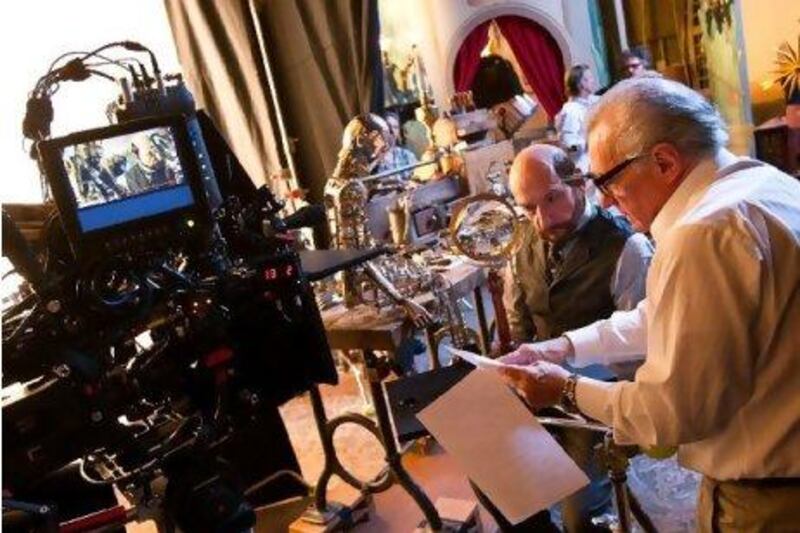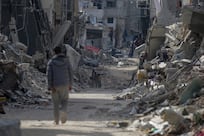On the surface, Hugo doesn't really seem like a typical Martin Scorsese film. After all, it's adapted from a children's book by Brian Selznick, the action takes place in Paris (although much of the film was shot in London) and it's in 3D.
Yet the biggest surprise is that the final result is possibly the 69-year-old director's most personal movie. A quite remarkable fact seeing as how Scorsese has made so many movies about New York, the city he famously grew up in.
Hugo takes place in a central Paris train station in the 1930s. Young Hugo Cabret is devastated at the early death of his inventor father (Jude Law). He cherishes his father's prized possession - a broken silver automaton - and hides in the station so that the cruel station inspector (Sacha Baron Cohen) doesn't send him kicking and screaming back to an orphanage. He befriends a young girl (Chloë Grace Moretz), whose godfather (Ben Kingsley) works in the station toy store. It turns out that Kingsley's character is none other than the cinema pioneer Georges Méliès, director of the classic A Trip to the Moon.
Films: The National watches
Film reviews, festivals and all things cinema related
[ Film ]
When I ask Kingsley if he looked at any director as a touchstone upon which to base his portrayal of Méliès, he says it was none other than Scorsese.
Kingsley's statement will come as no surprise to anyone who sees the film, as Hugo is more than a children's film. It's also about the history of cinema (narrative and technical) and the importance of movie preservation.
Adults will like it more than their children. Méliès, it turns out, lost everything in the First World War - his movie studio, most of the 500 films he had made and, most importantly, his desire to be in the public eye, making movies. And so, like many of Scorsese's best films (Raging Bull, Goodfellas), this is a story about broken dreams.
Making a film aimed at a younger audience, while Scorsese is advancing in years, means that there is a certain element of sentimentality about the picture.
"I hope it's not sentimental," says Scorsese. "Sentimental is surface, isn't it? I've always been emotional. Genuine sentiment is what I hope to show."
He continues: "You know, it's just a matter of growing older and then seeing people around you being born, dying. And having a child at a late age is different from when my first two daughters were born. I was in my 20s and 30s then and so it's a different perspective. It's time to think of the end, it's always been time to think of the end for me, being a Roman Catholic."
The director's youngest daughter Francesca Scorsese has had bit parts in The Aviator and The Departed; the 12-year-old girl is the child from Scorsese's fifth and current marriage, to Helen Morris. The director has had as eclectic a life off-screen as many of his characters do on screen.
Scorsese admits: "I'm not a cool and quiet person."
The film establishment used to overlook the director because of his wild reputation for partying back in the 1970s when he was part of the famed New Hollywood crew of filmmakers that included Francis Ford Coppola and Michael Cimino.
Yet as years passed, love for Scorsese just seemed to grow and grow, and he finally won the Oscar his work had deserved many times before for The Departed.
His new film is also being tipped for awards success, having recently won the National Board of Review's best film of 2011.
When I ask him what's the craziest thing he's ever done to get a film made, Scorsese says: "There are 40 years of work here, pretty much every film was difficult. It feels like I'm kind of boasting, in a way, to talk about it, but I never really realise what's involved in the making of a film, with all the characters, actors and locations. I remember cinematographer Michael Ballhaus and I were looking at each other during the first shot of The Last Temptation of Christ - the shot was impossible and he said: 'This is how it's going to be - a tough movie.'"
Every film offers up new challenges, and in Hugo, Scorsese's primary task was to keep his two 14-year-old stars, Asa Butterfield and Moretz, happy.
"First of all, you don't talk down to them," says the director. "You include them into the storytelling process. One thing I found being with the children is the importance of creating an atmosphere and making sure there is an aura of playfulness and enjoyment and excitement about what you're doing."
Moretz and Butterfield reveal it was hard work filming with Scorsese. "We did many takes in all the scenes," says Butterfield.
Moretz quickly chips in: "Yes, Marty likes to do a lot of takes."
He also sent the children films to watch to educate them for their roles. Moretz says, "On the first day we talked to him for 20 minutes, and then the next day he'd send you a whole box of all the works the director you were talking about has done and then the films associated with the actors, so you'd get like three boxes of different films he was talking about."
Scorsese's love for cinema is such that he set up the World Cinema Foundation in 1990 to preserve and restore neglected films, especially those from countries that might otherwise not be able to afford the process. One of the big scenes in Hugo sees Méliès's celluloid originals go up in flames.
As for Scorsese, he is proving that age hasn't withered him. His curiosity with cinema has also seen him work with 3D for the first time, a process he clearly loves despite the additional technical burden it places on the filmmaker.
"Starting out 3D was a blessing," says the director. "I loved working with 3D and I'd do it again in the future. The equipment is becoming more flexible and it should become less expensive. And I just like it. I've been fascinated by 3D since I was a child."
The director shows no signs of slowing down: already he's prepping his next film, Silence, an adaptation of Shusaku Endo's novel about two Jesuit priests in 17th-century Japan.






